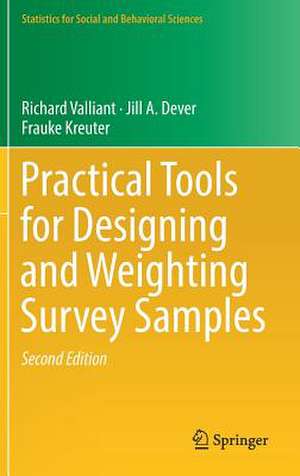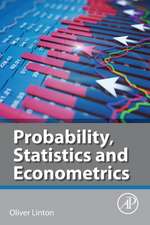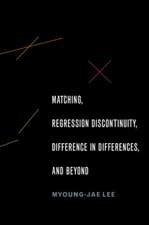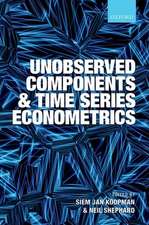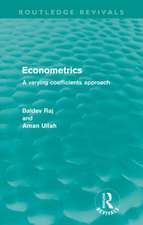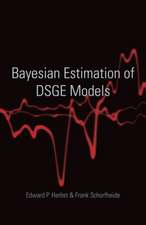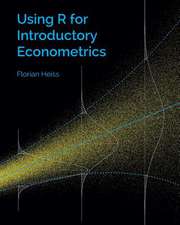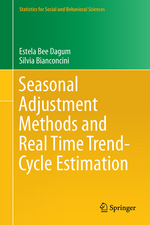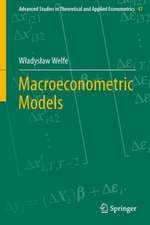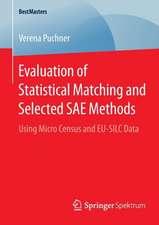Practical Tools for Designing and Weighting Survey Samples: Statistics for Social and Behavioral Sciences
Autor Richard Valliant, Jill A. Dever, Frauke Kreuteren Limba Engleză Hardback – 30 oct 2018
The text thoroughly covers fundamental aspects of survey sampling, such as sample size calculation (with examples for both single- and multi-stage sample design) and weight computation, accompanied by software examples to facilitate implementation. Features include step-by-step instructions for calculating survey weights, extensive real-world examples and applications, and representative programming code in R, SAS, and other packages.
Since the publication of the first edition in 2013, there have been important developments in making inferences from nonprobability samples, in address-based sampling (ABS), and in the application of machine learning techniques for survey estimation. New to this revised and expanded edition:
• Details on new functions in the PracTools package
• Additional machine learning methods to form weighting classes
• New coverage of nonlinear optimization algorithms for sample allocation
• Reflecting effects of multiple weighting steps (nonresponse and calibration) on standard errors
• A new chapteron nonprobability sampling
• Additional examples, exercises, and updated references throughout
Richard Valliant, PhD, is Research Professor Emeritus at the Institute for Social Research at the University of Michigan and at the Joint Program in Survey Methodology at the University of Maryland. He is a Fellow of the American Statistical Association, an elected member of the International Statistical Institute, and has been an Associate Editor of the Journal of the American Statistical Association, Journal of Official Statistics, and Survey Methodology.
Jill A. Dever, PhD, is Senior Research Statistician at RTI International in Washington, DC. She is a Fellow of the American Statistical Association, Associate Editor for Survey Methodology and the Journal of Official Statistics, and an Assistant Research Professor in the Joint Program in Survey Methodology at the University of Maryland. She has served on several panels for the National Academy of Sciences and as a task force member for the American Association of Public Opinion Research’s report on nonprobability sampling.
Frauke Kreuter, PhD, is Professor and Director of the Joint Program in Survey Methodology at the University of Maryland, Professor of Statistics and Methodology at the University of Mannheim, and Head of the Statistical Methods Research Department at the Institute for Employment Research (IAB) in Nürnberg, Germany. She is a Fellow of the American Statistical Association and has been Associate Editor of the Journal of the Royal Statistical Society, Journal of Official Statistics, Sociological Methods and Research, Survey Research Methods, Public Opinion Quarterly, American Sociological Review, and the Stata Journal. She is founder of the International Program for Survey and Data Science and co-founder of the Coleridge Initiative.
| Toate formatele și edițiile | Preț | Express |
|---|---|---|
| Paperback (2) | 461.41 lei 38-44 zile | |
| Springer – 15 iun 2015 | 461.41 lei 38-44 zile | |
| Springer International Publishing – 26 dec 2018 | 552.18 lei 43-57 zile | |
| Hardback (2) | 446.15 lei 38-44 zile | |
| Springer – 15 mai 2013 | 446.15 lei 38-44 zile | |
| Springer International Publishing – 30 oct 2018 | 811.61 lei 43-57 zile |
Din seria Statistics for Social and Behavioral Sciences
-
 Preț: 361.83 lei
Preț: 361.83 lei - 18%
 Preț: 889.75 lei
Preț: 889.75 lei - 20%
 Preț: 696.30 lei
Preț: 696.30 lei - 15%
 Preț: 586.38 lei
Preț: 586.38 lei -
 Preț: 393.13 lei
Preț: 393.13 lei - 15%
 Preț: 648.24 lei
Preț: 648.24 lei - 18%
 Preț: 896.70 lei
Preț: 896.70 lei - 18%
 Preț: 904.11 lei
Preț: 904.11 lei - 18%
 Preț: 782.10 lei
Preț: 782.10 lei - 15%
 Preț: 649.54 lei
Preț: 649.54 lei - 23%
 Preț: 788.31 lei
Preț: 788.31 lei -
 Preț: 390.46 lei
Preț: 390.46 lei - 15%
 Preț: 650.04 lei
Preț: 650.04 lei - 18%
 Preț: 806.87 lei
Preț: 806.87 lei - 18%
 Preț: 952.26 lei
Preț: 952.26 lei - 18%
 Preț: 1126.52 lei
Preț: 1126.52 lei - 18%
 Preț: 1005.11 lei
Preț: 1005.11 lei - 18%
 Preț: 1219.94 lei
Preț: 1219.94 lei - 18%
 Preț: 897.65 lei
Preț: 897.65 lei - 15%
 Preț: 588.37 lei
Preț: 588.37 lei - 15%
 Preț: 644.30 lei
Preț: 644.30 lei - 18%
 Preț: 730.97 lei
Preț: 730.97 lei -
 Preț: 381.21 lei
Preț: 381.21 lei - 15%
 Preț: 638.43 lei
Preț: 638.43 lei - 18%
 Preț: 1228.47 lei
Preț: 1228.47 lei -
 Preț: 386.81 lei
Preț: 386.81 lei - 15%
 Preț: 639.73 lei
Preț: 639.73 lei -
 Preț: 381.00 lei
Preț: 381.00 lei - 18%
 Preț: 1223.74 lei
Preț: 1223.74 lei -
 Preț: 385.25 lei
Preț: 385.25 lei - 15%
 Preț: 702.87 lei
Preț: 702.87 lei -
 Preț: 383.33 lei
Preț: 383.33 lei - 18%
 Preț: 1228.47 lei
Preț: 1228.47 lei -
 Preț: 390.25 lei
Preț: 390.25 lei
Preț: 811.61 lei
Preț vechi: 989.77 lei
-18% Nou
155.32€ • 161.17$ • 129.82£
Carte tipărită la comandă
Livrare economică 17-31 martie
Specificații
ISBN-10: 331993631X
Pagini: 468
Ilustrații: XXVI, 776 p. 66 illus., 14 illus. in color.
Dimensiuni: 155 x 235 x 44 mm
Greutate: 1.29 kg
Ediția:2nd ed. 2018
Editura: Springer International Publishing
Colecția Springer
Seria Statistics for Social and Behavioral Sciences
Locul publicării:Cham, Switzerland
Cuprins
Recenzii
Notă biografică
Jill A. Dever, PhD, is Senior Research Statistician at RTI International in Washington, DC. She is a Fellow of the American Statistical Association, Associate Editor for Survey Methodology and the Journal of Official Statistics, and an Assistant Research Professor in the Joint Program in Survey Methodology at the University of Maryland. She has served on several panels for the National Academy of Sciences and as a task force member for the American Association of Public Opinion Research’s report on nonprobability sampling.
Frauke Kreuter, PhD, is Professor and Director of the Joint Program in Survey Methodology at the University of Maryland, Professor of Statistics and Methodology at the University of Mannheim, and Head of the Statistical Methods Research Department at the Institute for Employment Research (IAB) in Nürnberg, Germany. She is a Fellow of the American Statistical Association and has been Associate Editor of the Journal of the Royal Statistical Society, Journal of Official Statistics, Sociological Methods and Research, Survey Research Methods, Public Opinion Quarterly, American Sociological Review, and the Stata Journal. She is founder of the International Program for Survey and Data Science and co-founder of the Coleridge Initiative.
Textul de pe ultima copertă
The text thoroughly covers fundamental aspects of survey sampling, such as sample size calculation (with examples for both single- and multi-stage sample design) and weight computation, accompanied by software examples to facilitate implementation. Features include step-by-step instructions for calculating survey weights, extensive real-world examples and applications, andrepresentative programming code in R, SAS, and other packages.
Since the publication of the first edition in 2013, there have been important developments in making inferences from nonprobability samples, in address-based sampling (ABS), and in the application of machine learning techniques for survey estimation. New to this revised and expanded edition:
• Details on new functions in the PracTools package
• Additional machine learning methods to form weighting classes
• New coverage of nonlinear optimization algorithms for sample allocation
• Reflecting effects of multiple weighting steps (nonresponse and calibration) on standard errors
• A new chapter on nonprobability sampling • Additional examples, exercises, and updated references throughout
Richard Valliant, PhD, is Research Professor Emeritus at the Institute for Social Research at the University of Michigan and at the Joint Program in Survey Methodology at the University of Maryland. He is a Fellow of the American Statistical Association, an elected member of the International Statistical Institute, and has been an Associate Editor of the Journal of the American Statistical Association, Journal of Official Statistics, and Survey Methodology.
Jill A. Dever, PhD, is Senior Research Statistician at RTI International in Washington, DC. She is a Fellow of the American Statistical Association, Associate Editor for Survey Methodology and the Journal of Official Statistics, and an Assistant Research Professor in the Joint Program in Survey Methodology at the University of Maryland. She has served on several panels for the National Academy of Sciences and as a task force member for the American Association of Public Opinion Research’s report on nonprobability sampling.
Frauke Kreuter, PhD, is Professor and Director of the Joint Program in Survey Methodology at the University of Maryland, Professor of Statistics and Methodology at the University of Mannheim, and Head of the Statistical Methods Research Department at the Institute for Employment Research (IAB) in Nürnberg, Germany. She is a Fellow of the American Statistical Association and has been Associate Editor of the Journal of the Royal Statistical Society,Journal of Official Statistics, Sociological Methods and Research, Survey Research Methods, Public Opinion Quarterly, American Sociological Review, and the Stata Journal. She is founder of the International Program for Survey and Data Science and co-founder of the Coleridge Initiative.
Caracteristici
Descriere
Survey sampling is fundamentally an applied field. The goal in this book is to put an array of tools at the fingertips of practitioners by explaining approaches long used by survey statisticians, illustrating how existing software can be used to solve survey problems, and developing some specialized software where needed. This book serves at least three audiences: (1) Students seeking a more in-depth understanding of applied sampling either through a second semester-long course or by way of a supplementary reference; (2) Survey statisticians searching for practical guidance on how to apply concepts learned in theoretical or applied sampling courses; and (3) Social scientists and other survey practitioners who desire insight into the statistical thinking and steps taken to design, select, and weight random survey samples.
Several survey data sets are used to illustrate how to design samples, to make estimates from complex surveys for use in optimizing the sample allocation, and to calculate weights. Realistic survey projects are used to demonstrate the challenges and provide a context for the solutions. The book covers several topics that either are not included or are dealt with in a limited way in other texts. These areas include: sample size computations for multistage designs; power calculations related to surveys; mathematical programming for sample allocation in a multi-criteria optimization setting; nuts and bolts of area probability sampling; multiphase designs; quality control of survey operations; and statistical software for survey sampling and estimation. An associated R package, PracTools, contains a number of specialized functions for sample size and other calculations. The data sets used in the book are also available in PracTools, so that the reader may replicate the examples or perform further analyses.
